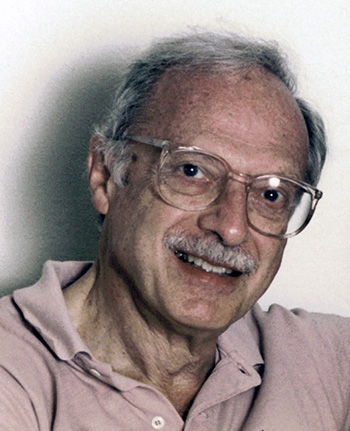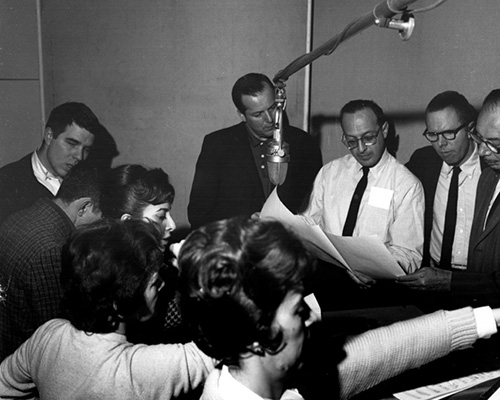

  |
|
|
||||||||||||||||||||||
|
FMS FEATURE... April 10, 2015 "The Other" Ray Charles: An Appreciation Beloved choral director, vocal arranger dead at 96 by Jon Burlingame  Charles died of cancer Monday, April 6, at his home in Beverly Hills, a family spokesman said. He was 96. Over seven decades, Charles worked in radio, TV, movies, records and personal appearances with a stellar lineup including Perry Como, Frank Sinatra, Bing Crosby, Julie Andrews, Jackie Gleason, Gene Kelly, John Denver, Dick Van Dyke, Andy Williams, the Carpenters and the Muppets. And, as he liked to point out, "every night, somewhere," he could be heard singing the theme for TV's Three's Company. Charles dueted with Julia Rinker on the 1977-84 hit series' Joe Raposo tune "Come and Knock on Our Door," which still plays around the world in reruns. Charles' longest-running gig was as choral director, vocal arranger and general "man-of-all-music" (as he once put it) for Como. They worked together for more than 35 years, much of that time in weekly television (with Charles as producer of the Como show from 1965 to 1967). It was Como who christened Charles' choral group The Ray Charles Singers. They went on to record some 30 albums, hitting number 3 on the Billboard charts in 1964 with "Love Me With All Your Heart (Cuando Calienta El Sol)" and scoring such other top-40 hits as "Al-Di-La" and "One More Time" in the mid-'60s. Charles worked on some of TV's most prestigious programs, including more than two decades as choral director for The Kennedy Center Honors and more than a decade as musical consultant and vocal arranger for two of public television's highest rated annual music specials, the Memorial Day Concert and A Capitol Fourth. A native of Chicago, he was the grandson of a cantor, studied piano from age 11 and was singing professionally on radio while he was still in high school. Largely self-taught as an arranger, he began writing arrangements for a vocal quartet in 1937 while continuing to perform all kinds of music (from operetta to popular) on Chicago radio stations. Charles moved in 1942 to New York, where he discovered that his talents were very much in demand. Within days of his arrival he was performing in NBC's legendary Studio 8H, and within weeks he was singing solos and as part of choral groups on some of radio's most celebrated shows: The March of Time, The Kate Smith Hour and The Westinghouse Program. By the time Charles joined the Navy in 1944, he was performing and/or arranging for 10 live radio shows a week. And upon his return to civilian life in 1946, he remained one of radio's most widely sought-after arrangers, also including stints as a commercial jingle composer and performer. He wrote musical signatures for Chesterfield and 7-Up, and that's his voice on the original "mmm, mmm, good" jingle for Campbell Soups.  Ray Charles (in white shirt) instructs choirPhoto by Harmonious Productions Inc. It was in the late 1940s that Charles began his long association with singer Perry Como, on NBC's Chesterfield Supper Club radio show, which aired three times a week. When Como moved to CBS television in the fall of 1950, The Ray Charles Singers were an integral part of the ensemble. Como's show ran three times a week through 1955, then became an hour-long variety show that ran on NBC through 1963. The team, including Charles and music director Nick Perito, remained intact when Como's show went to a once-a-month airing for the next four years, and on occasional specials thereafter. It was Charles who penned the upbeat "Letters, We Get Letters" that became a Como tradition. Coinciding with Charles' work with Como in the early 1950s was a seven-year stint as choral director on NBC's TV version of the long-running radio show Your Hit Parade. His final radio work was as choral director and vocal arranger on NBC's big-budget, Tallulah Bankhead-hosted The Big Show in 1950-51. During the 1960s and '70s, the heyday of television variety series and specials, Charles was everywhere. His two Emmy wins, for Music, Lyrics and Special Material, were for The First Nine Months Are the Hardest, which aired on NBC in January 1971, and the NBC sketch-comedy series The Funny Side, from the fall of 1971. He received eight other Emmy nominations, for writing special vocal material, music and lyrics, music direction and arrangements, for work on The Julie Andrews Show (1965), Perry Como's Christmas in the Holy Land (1980), The Stars Salute the U.S. Olympic Team (1984), America Picks the Number One Songs (1986), The Kennedy Center Honors (1988, 1989, 1991) and Bob Hope: the First Ninety Years (1993). During the late 1970s, Charles worked on The Muppet Show, creating special material, writing arrangements and producing the vocals for Jim Henson's beloved characters during its last two seasons of production in London. While in England, his talents were showcased in a BBC television special, Ray Charles' World of Music, that aired in 1979. For the big screen, Charles oversaw choral work on the Barbra Streisand film Funny Lady (1975) and the '40s period drama Racing With the Moon (1984). He and his son Jon served as co-musical directors on the syndicated series Sha Na Na (1977-80), on which his daughter Wendy was assistant director. He also contributed to many award shows, including choral direction on two Academy Award telecasts, Grammy Awards, People's Choice Awards and American Film Institute salutes. He wrote the closing medley for the last Rat Pack tour of Frank Sinatra, Dean Martin and Sammy Davis Jr. Charles received the American Society of Music Arrangers and Composers' Irwin Kostal Award in 2004 and ASCAP Foundation's Life in Music Award in 2013. His wife Bernice died in 2002 and his daughter Wendy in 2004. He is survived by sons Michael and Jonathan; and four grandchildren. ©2015 Jon Burlingame |
Search
Past Features
|